As evident by the name, Ironite for lawns is an iron supplement for grass.
Everyone wants to have a lush green lawn. It is a criterion we instinctively look at to assess the health of a lawn and its beauty. However, establishing a healthy green lawn is not as straightforward as you might believe. To achieve that, you need top-notch maintenance, and at the heart of it is fertilization.
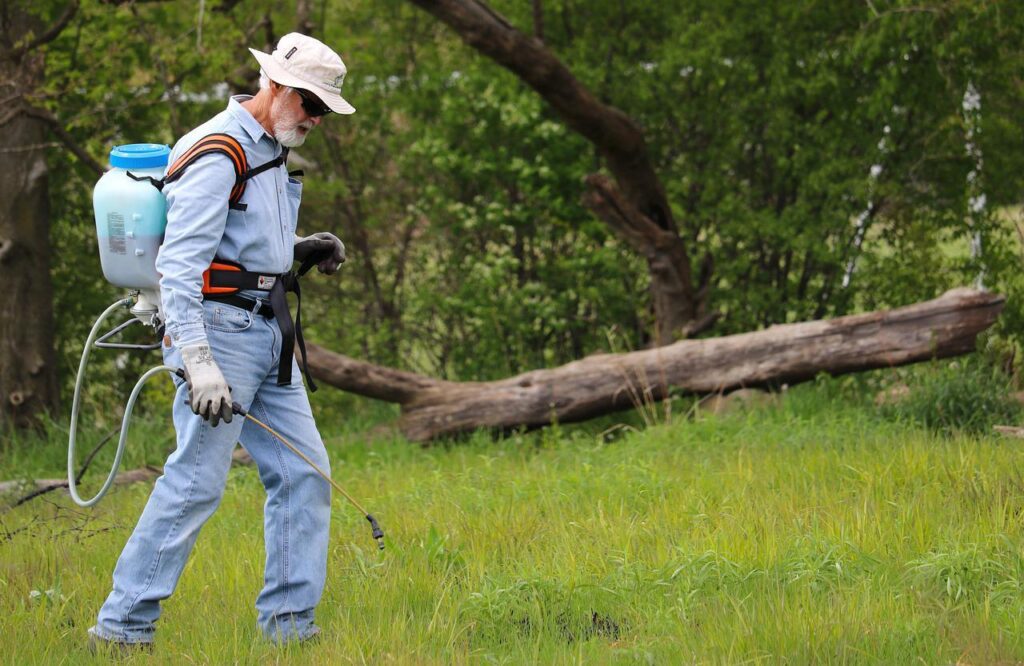
As evident by the name, Ironite is an iron supplement for grass.
Everyone wants to have a lush green lawn. It is a criterion we instinctively look at to assess the health of a lawn and its beauty. However, establishing a healthy green lawn is not as straightforward as you might believe. To achieve that, you need top-notch maintenance, and at the heart of it is fertilization.
Proper fertilization is a must if you want your grass to reach its full potential. A well-fertilized lawn is not only immune to many lawn issues, but it also looks great and green. However, an all-purpose fertilizer is sometimes insufficient to make your lawn lush green on its own, and that is where Ironite comes in.
Ironite is a commonly used iron fertilizer that helps the grass green-up. In addition to containing all the essential nutrients for healthy grass growth, it contains a high amount of iron. Iron supports the formation of chlorophyll in grass blades; chlorophyll is the pigment that gives grass its green color.
That said, you cannot just throw Ironite on your grass and expect it to turn green. Ironite needs to be used in a proper way and in the correct quantity. Keep reading to learn more!
What Is Ironite
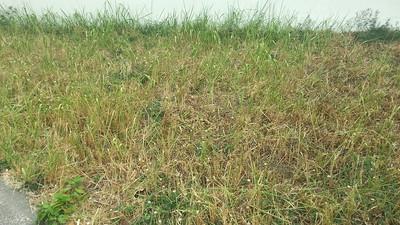
Sometimes all it takes is a little iron to fix a yellowing lawn.
Ironite is an iron-based mineral supplement that helps you restore a pale green, yellowing lawn to its lush green glory. Its specialized formula gives your lawn a dark green color without promoting excess growth, which nitrogen-rich lawn fertilizers can bring.
So, you will spend less time mowing and maintaining and more time enjoying your green lawn. Also, unlike many other nitrogen-based fertilizers and supplements, Ironite does not burn grass or stain concrete when used as directed.
RELATED: Ironite Vs Milorganite: What’s The Difference and Which Is Better?
What is Ironite good for?
Ironite works by increasing the synthesis of oxygen-carrying enzymes and chlorophyll in the grass. Since chlorophyll is the primary pigment that gives plants their green color, increased chlorophyll in grass blades makes them dark green and aesthetically pleasing.
However, unlike what its name suggests, Ironite does not just contain iron alone. It also has minute quantities of potash, nitrogen, and manganese. Ironite can be used with general all-purpose fertilizers depending on the condition of your turf.
Types of Ironite Fertilizers
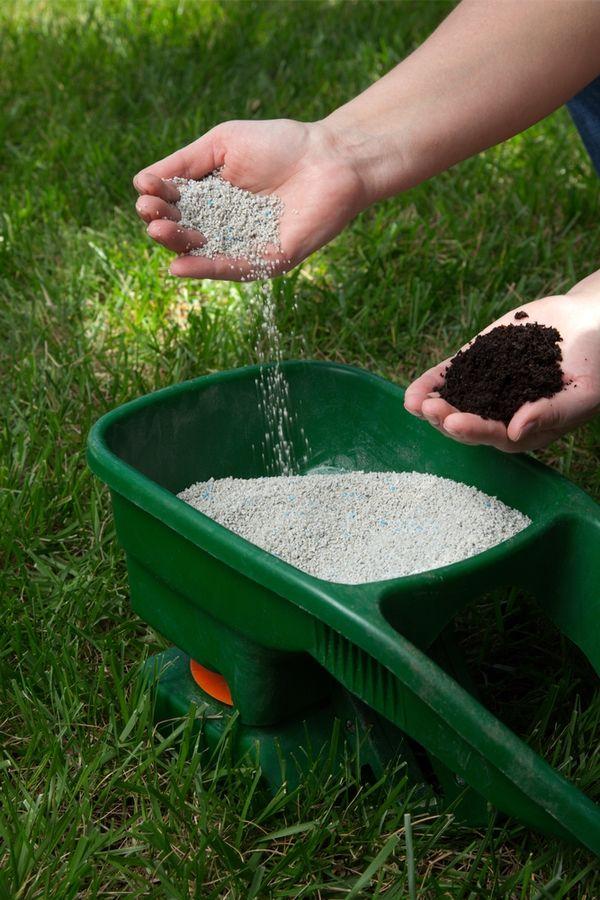
Ironite can be organic or synthetic as well as liquid or solid.
Ironite comes in two forms and types. You can choose either depending on your requirements and ease of application.
Organic Ironite
Organic Ironite is obtained from natural sources such as greensand and Milorganite. It releases its nutrients relatively slowly into the soil, and grass can uptake nutrients as it requires. That is why it lasts longer in the soil than its synthetic counterpart.
Moreover, the chance of causing fertilizer burns is relatively low when using organic Ironite as it releases its contents slowly. Moreover, it also won’t stain concrete in your yard.
Synthetic Ironite
These are synthetically produced iron-based supplements or fertilizers intended to produce quick results. It is because they are based on a fast-release formula and deliver iron almost instantaneously to the soil.
As a result, nutrients and iron become available to the grass all at once, and it greens up very quickly. However, because of their fast-release formula, synthetic Ironite can also severely stain concrete objects in your yard.
Forms of Ironite
Ironite comes in two forms. Liquid and granular, which are described in detail below.
Granular Ironite
As evident by the name, granular Ironite comes in the form of granules. These granules can be used by directly spreading them uniformly over your lawn with a broadcast spreader and then watering the area immediately afterward.
The water helps the granules stick to the soil and break down. Then slowly, nutrients work their way into the ground, where the grass absorbs them. Granular Ironite works best in loamy soils but can also be used in clay soil.
Liquid Ironite
If you are looking for immediate results, liquid Ironite is the way to go. It comes in liquid or spray form. You can spray that directly on the grass. It gets readily absorbed into the grass blades, thus producing quicker results.
Liquid Ironite is most suitable for alkaline and sandy soils. There is no need to water your grass after treating it with liquid Ironite. It can wash the supplement off grass blades.
Ironite Application Rate
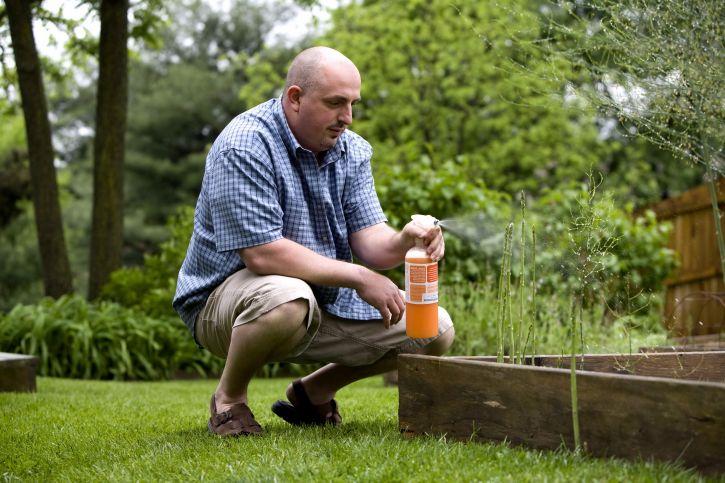
Do not water your lawn after spraying liquid Ironite on it.
Granular and liquid Ironite have different application rates. When it comes to granular Ironite, historically, it was set at one pound per 100 square feet of lawn. However, the company has recently changed its formula, and they now suggest using 1/3 pound of Ironite for about 100 square feet of lawn.
However, if you use a liquid Ironite, you will need to spray around one ounce of Ironite per 100 square feet of lawn. Just make sure that you do not water your lawn for around 24 hours after spraying liquid Ironite on your grass.
When Should I Add Ironite To My Lawn?
You can use Ironite in your yard whenever your lawn soil is deficient in iron, or the grass is suffering from low iron availability. The best way to determine if your lawn soil is lacking in iron is to get a soil test. Moreover, you might also need to use an iron supplement on your lawn when the iron is there but not readily available to the grass.
This is usually the case in early spring when the grass is growing rapidly, but due to low soil temperatures, iron is not available to the growing grass. This means that you will have to artificially feed your grass using an iron supplement such as Ironite.
How To Apply Ironite?
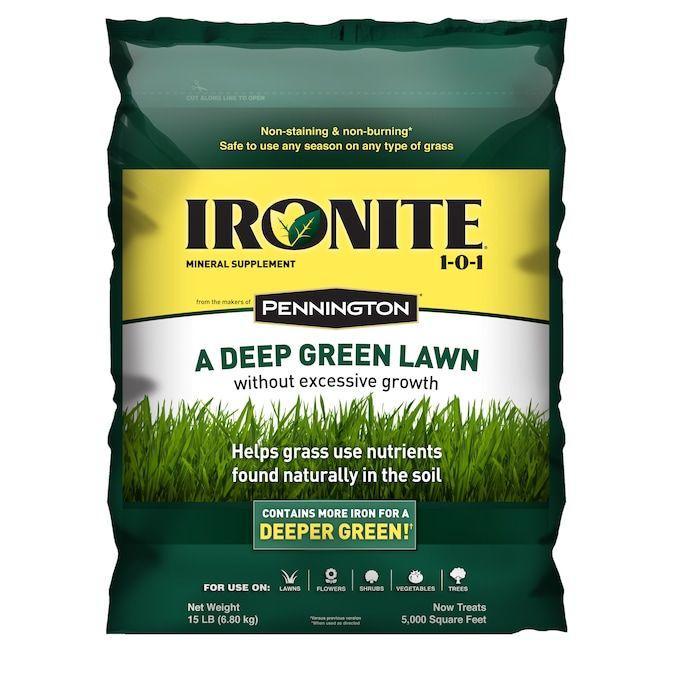
Always use the recommended amount when feeding your lawn with Ironite.
First of all, ensure you have read all the instructions on the product bag or bottle. It will help prevent overusing Ironite and obtain the best results. After that, you can use the following procedure to feed your lawn with Ironite:
- Wear complete protective gear and ensure your hands and face are covered.
- Take the required amount of Ironite carefully out of the bag and seal the bag.
- Use a broadcast spreader to distribute Ironite granules in your yard evenly.
- If you use liquid Ironite, spray it evenly over your lawn.
- Properly water your lawn immediately afterward in case of granular Ironite.
- Make sure your pets and children can’t access the lawn following the application.
- Avoid spreading Ironite on concrete and other objects in your yard.
RELATED: Why and When Should You Add Iron To Your Lawn For The Best Results
Benefits Of Using Ironite
In addition to the benefits mentioned above of using iroite in your yard, its unique formula gives it many advantages over other similar products. These advantages are described below.
Versatility
In addition to being used on grass, Ironite can also be used in flower beds, vegetable gardens, shrubs, and trees to green them up.
Water Savings
Ironite’s unique formula significantly reduces the amount of water required to keep your lawn healthy and green.
Works Well In All Soils
Both liquid and granular Ironite work well in all soil types. However, granular Ironite shows the best results in loamy soils, while liquid Ironite works best in sandy alkaline soils.
Doesn’t Burn
Another advantage of using Ironite is that it does not burn grass if overused. However, its overuse can still turn the grass gray, so be careful.
Disadvantages Of Using Ironite
Ironite is an excellent product, and its benefits far outweigh the disadvantages of its use. Nonetheless, here are a few drawbacks of using Ironite in your yard:
- It can stain concrete objects in your yard.
- Contains harmful chemicals that can damage the environment.
Conclusion | Ironite For Lawns
Ironite is your best bet if you have a yellowing lawn and need a quick fix. However, keep in mind that using Ironite is only a temporary fix. If you do not want the yellowing lawn issue to come back, you will need to fix the underlying problem of the lack of iron. Also, keep in mind that when using Ironite, do not let it wash into drains or waterways. It contains harmful chemicals that can damage the environment.
Nonetheless, if used correctly, Ironite will transform your yellow grass into a lush green lawn in a matter of just a few days.
Frequently Asked Questions (FAQs)
What can I use instead of Ironite?
There are a few alternatives if you do not want to use Ironite on your lawn. You can either use Dr. Iron which works similarly to Ironite, or you can use Milorganite, which is more of an organic solution to lawn iron problems.
Does Ironite really work? Is Ironite worth the money?
Ironite is a great product and works well if your lawn suffers from an iron deficiency. However, it is not an all-purpose fertilizer, and if your lawn is lacking in any other nutrients, it might not be the right choice. So, get your soil tested before buying and applying Ironite to your lawn.
How often can Ironite be applied?
Depending on your lawn’s condition, you can use Ironite a maximum of four to five times. However, in no case use Ironite more than ten times a year.
Can you apply fertilizer and Ironite at the same time?
You can use Ironite with a regular fertilizer since it is more of a supplement than a fertilizer. Its primary role is to fix the iron deficiency of your lawn soil.
What happens if you apply too much Ironite?
Applying too much Ironite won’t cause grass burns, but it can turn your grass gray which will ruin the aesthetics of your turf.
Should you water after applying Ironite?
Ironite contains iron in the form of iron sulfate. You will need to water the grass to help this compound break down and dissolve into the soil.
Sources for Further Reading
Utilizing Iron In Turfgrass Management – University of Illinois
Iron Chlorosis in Turfgrass – Texas A&M University Extension
Iron Applications for Turf – Turfgrass Research, Education & Extension at University of Arizona







